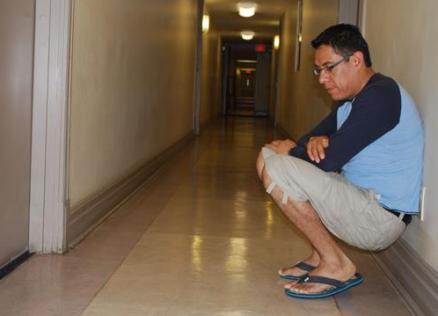The emergency medical dispatcher who received the first call when James Hearst collapsed of a heart attack on June 25, 2009, wrongly classified the call as “unknown trouble” rather than a “fall,” kicking off a sequence of events that led paramedics to wait around the corner from the scene for more than 30 minutes while Hearst lay dying, a coroner’s inquest into the death heard Jan 30.
Hearst died of a heart attack in the hallway of his Alexander St apartment complex while waiting for EMS. His death drew widespread attention and criticism of the actions of the paramedics involved and has already been the subject of an inquiry by the Ministry of Health and Long-Term Care that concluded five EMS staffers made serious errors, including not following proper procedures.
Under questioning from coroner’s council Stefania Fericean, dispatcher Ryan Leblanc testified that he did not hear the caller say that Hearst had fallen, only that he was on the ground and had been trying to get up. The caller said that he couldn’t see Hearst from where he was calling and couldn’t get closer without losing cell reception.
Leblanc classified the call as “unknown trouble” and proceeded to ask questions about Hearst, according to the protocol required of dispatchers when dealing with “unknown trouble.”
The distinction raised a red flag in the dispatch system that meant paramedics should not enter the scene without police backup, as there could be safety hazards on the scene.
The caller told Leblanc that “it looks like he [Hearst] might be drunk,” referring to Hearst’s failed attempts to get up from the ground. Leblanc says he did not ask the caller to clarify that statement because dispatchers are taught not to “question a caller’s integrity” or to engage in “freelance questions” that are not included on the protocol script.
Leblanc recorded the code “HBD,” meaning “had been drinking,” into the 911 system. Police are required on the scene when paramedics believe that a patient may be drunk as it represents a possible safety hazard.
“I did not know if this person was intoxicated and had the ability to get up and be a safety hazard,” Leblanc said.
One question Leblanc didn’t ask was “Tell me exactly what happened,” which is included in the prompt script. Leblanc says he “relied on the information he had previously volunteered” to establish the details. But this left Leblanc with an inaccurate description of the medical emergency that was unfolding.
Consequently, when paramedics arrived, they waited on Yonge St for police to escort them into the apartment instead of going directly to the scene. The paramedics were later sanctioned for not investigating the scene themselves.
Because Hearst’s death took place during the 2009 city workers’ strike, many linked these mistakes to the fact that EMS was working at 75 percent capacity as per their strike agreement with the city.
Due to the strike, the dispatch room was understaffed and management personnel were assisting with taking calls. Leblanc theorized that someone who was inexperienced with the dispatch system might not have known how to check that a call in the system was being staged, and thus would have missed that the call to Alexander St was not being served.
Having been sanctioned by the previous investigation and given additional training, Leblanc says that “with all information in hindsight” he would have asked for more detailed information from the caller.
“It could have provided a clearer picture of what was happening to the paramedics,” he says. “I believed the patient to be conscious.”
The long-delayed coroner’s inquest was first called in February 2010 and was scheduled to begin in April of that year. It opened Jan 24, 2012, and continues to Feb 17 at the Toronto Coroner’s Courts, 15 Grosvenor St. The inquest, taking place before a coroner and a five-person jury, may lead to recommendations of how to avoid similar deaths.


 Why you can trust Xtra
Why you can trust Xtra


